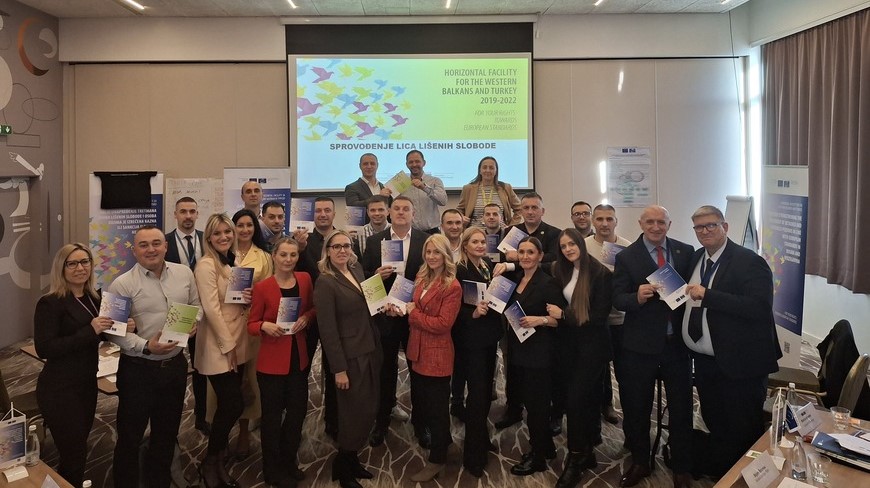Classrooms in the Police Academies for police cadets and junior inspectors in Bosnia and Herzegovina are ready to welcome back 24 of their lecturers and instructors, after a professional development programme on human rights safeguards. As part of the joint EU/Council of Europe programme, the teaching staff took their final step in a journey that has reshaped how they teach, communicate, and think about policing on 13-14 November 2025 in Sarajevo during a skills’ verification session.
Over the past ten months, these women and men have been part of a Train the Trainer programme designed to embed human rights at the heart of police education for cadets and professional development for serving police officers in Bosnia and Herzegovina.
The accreditation process represents an important step toward strengthening the professionalism, accountability, and rights-based approach within law enforcement institutions across Bosnia and Herzegovina.
For many, this week’s two-day session marks more than an assessment and verification of their communication and presentation skills—it represents a commitment to changing how future police officers see their role in protecting individuals’ rights.
“When I first started teaching at the Academy, I focused mainly on the legal framework,” says one instructor from the Police Academy of Republika Srpska Ministry of Interior in Banja Luka. “Now, I focus on the person deprived of liberty—on what those legal provisions mean for someone in custody, or for their family. Legal provisions are nothing without the soft law, they need to be translated into daily practice and operational procedures. That’s a huge shift and this is why what we learn here is so important.”
The initiative has given Police Academy teaching staff the tools to deliver accredited human rights modules to cadets and junior inspectors. These modules focus on the rights most vulnerable to abuse immediately on apprehension and during temporary detention in police custody—the rights to a lawyer and a doctor, and the right to inform a relative or third party of one’s custody.
In addition, the police teaching staff acquired skills to deliver interactive training focusing on practical exercise on structured interviewing techniques and how to police public gatherings in line with human rights obligations police officers have as public servants. Their training draws directly on the work of the European Committee for the Prevention of Torture (CPT) and its recommendations to Bosnia and Herzegovina.
“This programme has helped us move from theory to practice,” explains another lecturer from the Police Academy of the Ministry of Interior of the Federation of BiH in Sarajevo. “We now know how to base our sessions on the case law of the European Court for human rights, how to design role plays so that international standards come alive and which methods to use to teach cadets what respecting human rights really looks like in daily policing.”
As part of this 7th generation of human rights trainers accredited in a series of Council of Europe-implemented projects in Bosnia and Herzegovina over the past two decades, these 24 human rights trainers return to their Academies to share what they’ve learned, reaching hundreds of future officers each year.
The ultimate effect of this cascading effort is clear: every lesson they deliver helps build a more accountable and professional police force—one that serves the public with respect and integrity.
The activity was organised as part of the action “Further strengthening the treatment of detained and sentenced persons in line with European standards in Bosnia and Herzegovina“ under the joint Council of Europe and European Union programme “Horizontal Facility for the Western Balkans and Türkiye”.

